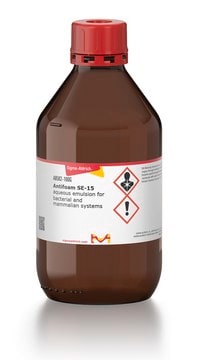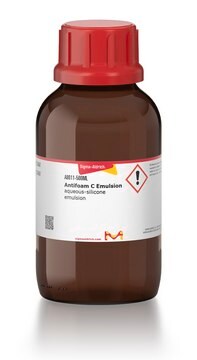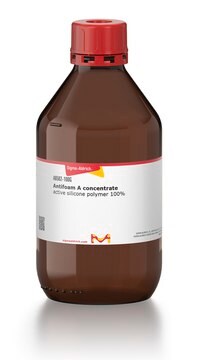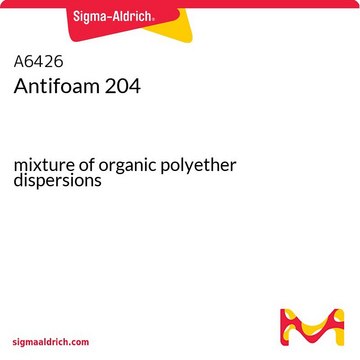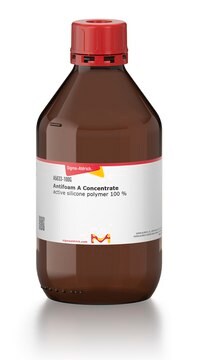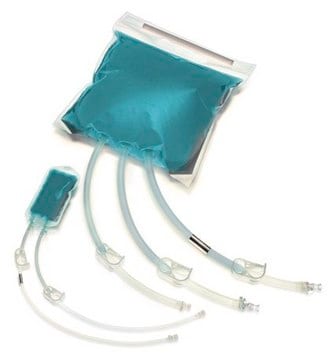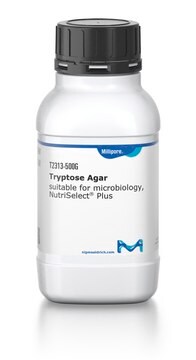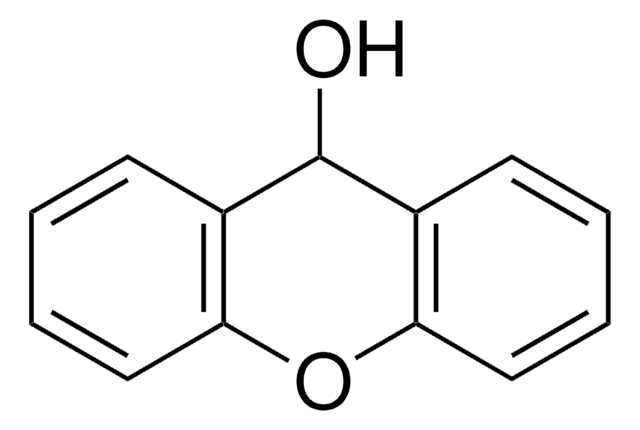A5758
Antifoam Y-30 Emulsion
aqueous-silicone emulsion
Faça loginpara ver os preços organizacionais e de contrato
About This Item
Código UNSPSC:
12161900
Produtos recomendados
Descrição geral
Antifoam Y-30 Emulsion is an aqueous emulsion containing 30% active silicon. It contains non-ionic emulsifiers different from those in Antifoam Emulsions B and C. It is designed to control foam in aqueous systems.
Antifoam is also known as defoamer. It is a chemical additive that reduces and hinders the formation of foam in industrial process liquids. It is used to prevent formation of foam or is added to break foam that is already formed.
Aplicação
Antifoam Y-30 Emulsion is used for the following applications:
- Chemostat cultivation.
- Cultivation conditions, such as Fed-batch fermentation.
- Bacterial strains and growth conditions (used in all aerosol experiments).
Outras notas
A 30% aqueous emulsion of Antifoam A concentrate.
Ligação
More easily dispersed in aqueous systems than Antifoam A concentrate.
Código de classe de armazenamento
10 - Combustible liquids
Classe de risco de água (WGK)
WGK 3
Ponto de fulgor (°F)
Not applicable
Ponto de fulgor (°C)
Not applicable
Equipamento de proteção individual
Eyeshields, Gloves, type ABEK (EN14387) respirator filter
Certificados de análise (COA)
Busque Certificados de análise (COA) digitando o Número do Lote do produto. Os números de lote e remessa podem ser encontrados no rótulo de um produto após a palavra “Lot” ou “Batch”.
Já possui este produto?
Encontre a documentação dos produtos que você adquiriu recentemente na biblioteca de documentos.
Os clientes também visualizaram
Adrien Pagnier et al.
Proceedings of the National Academy of Sciences of the United States of America, 113(1), 104-109 (2015-12-25)
The synthesis and assembly of the active site [FeFe] unit of [FeFe]-hydrogenases require at least three maturases. The radical S-adenosyl-l-methionine HydG, the best characterized of these proteins, is responsible for the synthesis of the hydrogenase CO and CN(-) ligands from
Modeling of growth and energy metabolism of Pichia pastoris producing a fusion protein.
M. Jahic, J.C. Rotticci-Mulder, M. Martinelle, K. Hult, S-O. Enfors
Bioprocess and Biosystems Engineering, 24, 385-393 (2002)
Mehmedalija Jahic et al.
Microbial cell factories, 2(1), 6-6 (2003-07-23)
BACKGROUND: A temperature limited fed-batch (TLFB) technique is described and used for Pichia pastoris Mut+ strain cultures and compared with the traditional methanol limited fed-batch (MLFB) technique. A recombinant fusion protein composed of a cellulose-binding module (CBM) from Neocallimastix patriciarum
N Meinander et al.
Microbiology (Reading, England), 142 ( Pt 1), 165-172 (1996-01-01)
Recombinant Saccharomyces cerevisiae harbouring the xylose reductase (XR) gene XYL1 from Pichia stipitis was grown in anoxic chemostat culture at two different dilution rates. At each dilution rate a transient experiment, encompassing a shift in the sugar content of the
Divey Saini et al.
Tuberculosis (Edinburgh, Scotland), 92(2), 160-165 (2011-12-27)
A murine low dose (LD) aerosol model is commonly used to test tuberculosis vaccines. Doses of 50-400 CFU (24h lung CFU) infect 100% of exposed mice. The LD model measures progression from infection to disease based on organ CFU at
Nossa equipe de cientistas tem experiência em todas as áreas de pesquisa, incluindo Life Sciences, ciência de materiais, síntese química, cromatografia, química analítica e muitas outras.
Entre em contato com a assistência técnica